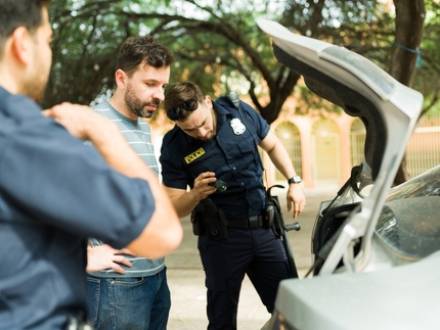When Are Police Allowed To Search Without a Warrant in Illinois?
 Law enforcement officers often rely on search and seizure to gather evidence in criminal cases. Often, for serious offenses, such as homicide and drug crimes, the prosecution’s case relies heavily on evidence collected during a search and seizure. Proving that evidence was obtained illegally, meaning in a way that violated your Constitutional Rights, can make a strong defense strategy. First, consider some circumstances that may seem unlawful but are not. If you have questions about your rights and how they apply to your case, a Cook County, IL criminal defense attorney can help.
Law enforcement officers often rely on search and seizure to gather evidence in criminal cases. Often, for serious offenses, such as homicide and drug crimes, the prosecution’s case relies heavily on evidence collected during a search and seizure. Proving that evidence was obtained illegally, meaning in a way that violated your Constitutional Rights, can make a strong defense strategy. First, consider some circumstances that may seem unlawful but are not. If you have questions about your rights and how they apply to your case, a Cook County, IL criminal defense attorney can help.
When is No Warrant Required for a Search in Illinois?
The Fourth Amendment guarantees your right to be secure in your person, papers, home, and effects, protecting you from unreasonable searches and seizures by a government entity, including the police. Generally, that means they must have probable cause and a valid warrant to search you or your property. However, exceptions to the rule include:
-
Consent: If you give the officers consent to a search, they can proceed without a warrant. They are also not required to inform you that you have the right to refuse consent.
-
Plain view: If an officer observes evidence of a crime in plain view without needing to search for it, they can seize it without requesting a warrant first. Where the officer is standing at the time is relevant, because they must have the legal right to be in the place where the evidence was in plain view.
-
Incident to arrest: If an officer arrests you, they can search you and the area surrounding you without a warrant. However, they only have that right when the arrest is justifiable.
-
Exigent circumstances: If the police have a reason to believe that waiting to obtain a warrant could result in the destruction of evidence, they can seize it without a warrant.
-
Vehicle searches: Because vehicles are mobile, officers can typically search them without a warrant if they have probable cause to believe the car contains evidence of a crime.
Search and seizure is prevalent in investigations for drug and weapons charges. If you have questions about how the police investigated your case, an experienced attorney can help.
Challenging Evidence Collected During an Illegal Search and Seizure
The first step in challenging evidence collected during an unlawful search and seizure is to file a motion to suppress. Your attorney will use this to argue that admitting the evidence against you would be a violation of your Fourth Amendment rights. If the court grants the motion, the evidence would be excluded from the trial, which can be devastating to the state’s case.
Contact a Chicago, IL Criminal Defense Attorney Today
If you were charged with a crime and believe the police conducted an illegal search and seizure to collect evidence against you, you should speak to a Cook County criminal defense lawyer immediately. Regardless of the charges, law enforcement must investigate and collect evidence within the boundaries of state and federal law. At the Law Offices of James F. DiQuattro, we will always go the extra mile to protect your rights and ensure you have a robust defense. Call 312-627-9482 to schedule your cost-free initial consultation today to learn more about your Fourth Amendment rights.
















